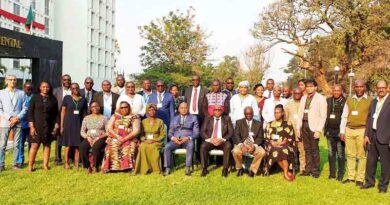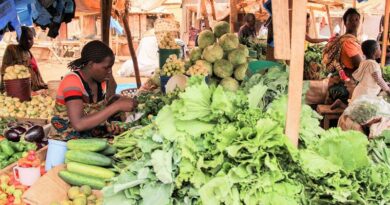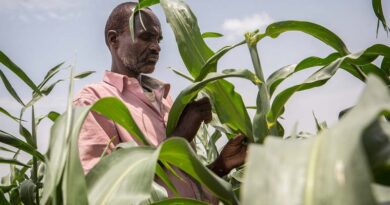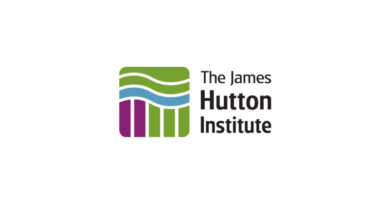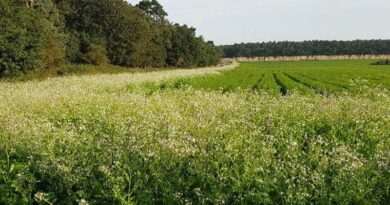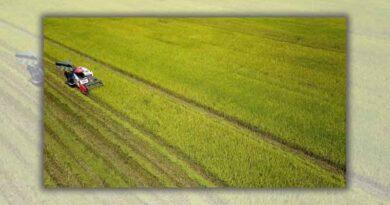CABI contributes to position paper highlighting plan to safeguard African biodiversity
20 March 2022, Africa: CABI has contributed its expertise in a new position paper in the journal Nature – from the African BioGenome Project (AfricaBP) – which highlights the goals, priorities, and roadmap of the impressive Africa-led effort to sequence the genomes of plants, animals, fungi, and protists that are endemic to the continent of Africa.
Dr Alan Buddie, Microbiology Research Leader at CABI, is sharing his expertise in identifying and characterising fungi, using molecular tools, as part of the AfricaBP project which hosts 109 African scientists and 22 African organizations, representing researchers and organizations from all five regions in the African Union.
AfricaBP is a partner to three complementary large-scale, global genomic efforts including the 10,000 Plants Genomes Project (10KP), the Vertebrate Genomes Project (VGP), and the Earth BioGenome Project (EBP).
Since its inception, AfricaBP has built a strong case for the need to understand the continent’s biodiversity through genomics and ensure the sustainable use of native plants, animals, fungi, and protists.
For example, culturally relevant food resources, such as orphan crops, and other staples that are crucial to regional food security, remain unsequenced. This genetic information is important to safeguard biodiversity and improve resilience in response to future environmental pressures such as climate change.
Dr Buddie said, “The possibility of obtaining a genome-level understanding of some of the key African crops and animals – as well as potentially elucidating tools for defeating some of the invasive weeds, insect pests and fungal pathogens that affect livelihoods and wellbeing in the African continent – would be one key outcome for the project.
“The work of the AfricaBP project is something that is well aligned with CABI’s overall mission and specific programmes such as PlantwisePlus which has a vision to help smallholder farmers increase their incomes and grow safer, higher quality food through climate-resilient approaches to crop production.”
Dr Buddie added that sequences from African plants, animals and, especially, fungi are underrepresented in the global sequence databases and in the global genomics studies undertaken to date. “We are potentially missing a wealth of genetic diversity even from species that we already know – as well as the opportunity to uncover new species in biodiversity hotspots,” he said.
Collecting, sequencing, and storing genomic information on the continent – by and for the African people – is a fundamental priority for AfricaBP. This will build resilience in breeding, sustainable food systems, and biodiversity conservation across the continent to deliver on the goals of the post-2020 Global Biodiversity Framework of the Convention on Biodiversity and the United Nations Sustainable Development Goals while complementing efforts by the Human Hereditary and Health (H3Africa) consortium.
The primary goals of AfricaBP cannot be accomplished without support from African governments, the African Union Commission, national and regional agencies, and international partners and organizations. Recognizing the errors of the past, AfricaBP plans to move forward with an equitable process to share the benefits materialized from its activities.
For example, it will work with policymakers on recommendations for laws and regulations governing national access and benefit sharing to include a cohesive continental agenda, while following and adapting the Nagoya Protocol for the project’s needs.
In addition to new policies to support AfricaBP, national governments will need to work in collaboration with regional and international partners to invest in infrastructure to support genomics and bioinformatics in Africa.
The estimated cost for AfricaBP is US $1 billion over 10-years. While this may seem like a huge endeavour, such an investment not only benefits the research enterprise, and this investment will have a return multiple times over in economic development to meet sustainable development goals.
Beyond the direct benefits of new technology and economic growth guaranteed by discoveries and investments in genomics and bioinformatics in Africa, AfricaBP also plans to develop a knowledge hub for the field.
Continuous and sustained investment in the early-career pipeline to support this effort–including universities and other technical education–will ensure opportunities for African scientists and incentives to stay in Africa after they have received training through genomics and bioinformatics projects housed on the continent. AfricaBP envisions developing a fellowship for early-career researchers to invest in the next generation of scientific leaders and sustain this vital work into the future.
“AfricaBP is not just a scientific project, but a socio-scientific project through which we hope to bring genomics and bioinformatics capacities closer to the African people,” said Dr ThankGod Echezona Ebenezer, Founder and Co-Chair of AfricaBP as well as a Bioinformatician at the European Bioinformatics Institute (EMBL-EBI), UK.
Dr Roksana Majewska, AfricaBP Pilot Committee Chair and a Researcher at North-West University, South Africa agrees, “AfricaBP is a huge, bold, and potentially truly transformative endeavor, which has a real chance to meaningfully support the autonomy, sustainable growth, and long-term wellbeing of African communities.”
“AfricaBP will ensure that cutting-edge scientific technologies that have mainly been accessible in high income countries are available for use within the continent,” adds Dr Anne Muigai, current Chair of the AfricaBP and Professor of Genetics at the Jomo Kenyatta University of Agriculture and Technology Kenya.
Overall, AfricaBP is committed to improving food security, natural resources conservation, and open data sharing in an inclusive and equitable way that centers on the priorities of the African people. It is an ambitious and promising project ready to lead the continent onto the next big stage of research and innovation.



